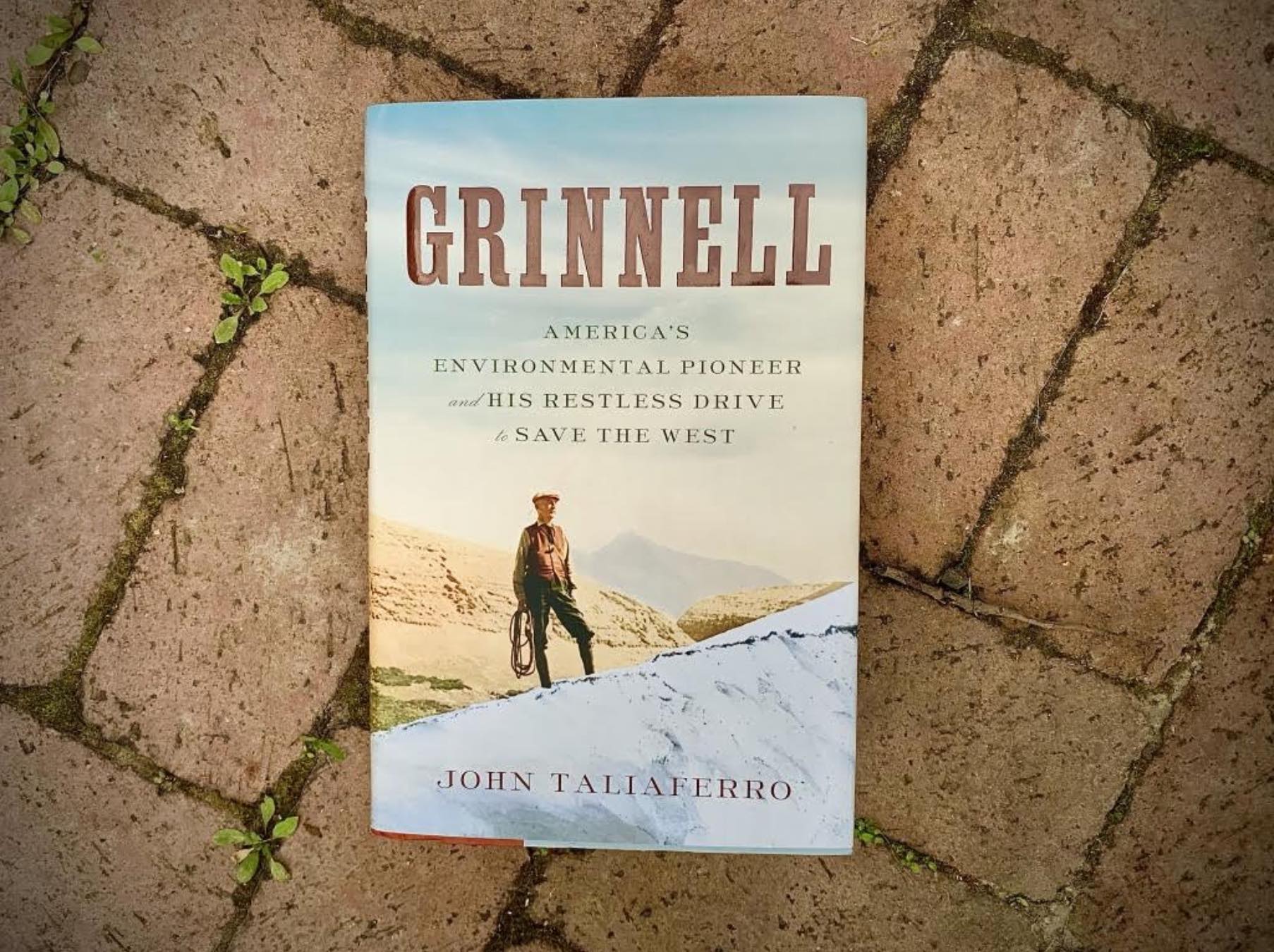Uncategorized
George Bird Grinnell
Published
5 years agoon
Posted By
Outlaw Partners

His impact as “The Father of American Conservation” written across today’s West
By Todd Wilkinson EBS ENVIRONMENTAL COLUMNIST
George Bird Grinnell is a towering and, in many ways, uneclipsed figure you ought to know about, not just because he has a melting glacier and other landmarks named after him in Glacier National Park. Or because— or perhaps in spite of— the fact he is likely to be dismissed by some in the “critical theory” community as one of those New York elitist, 19th-century, white-guy conservationists who matriculated at a place like Yale.
Grinnell’s influence actually factors into so many things today shaping our modern perception of the public land American West that his impact can only be described as colossal, even by detractors. It’s why many say Grinnell—not John Muir, Theodore Roosevelt or Henry David Thoreau— deservedly earned the title “the father of American conservation.”
In John Taliaferro’s new fascinating biography, “Grinnell: America’s Environmental Pioneer and His Drive to Save the West,” his subject rises as a pathfinding historic connector between people with big enduring ideas and landscapes—many of which continue to evolve.
Thanks to Grinnell’s tenacious love of Yellowstone, he foresaw, as a naturalist, the need to enlarge the park or at least secure winter range outside it for migrating wildlife, which would’ve resolved many current-day controversies. He also helped prevent portions of our first national park from being sacrificed to the whims of water developers who wanted to dam two park rivers and make the storage available for irrigating crops and livestock.
If you have a soft spot in your heart for indigenous people, then it’s essential to point out that Grinnell, as an ethnographer and author, evolved into becoming a fierce ally and friend of several different tribes in our corner of the West.
If you venerate Theodore Roosevelt, then you’ll want to know how important Grinnell was in building TR’s legacy, getting behind the cause of saving bison and elk from extinction, and protecting public lands in their nascent beginnings from robber barons.
If you hunt and fish, then crucial is understanding that Grinnell helped wordsmith many of the tenets Roosevelt advanced for fair chase and ethical hunting when they founded the Boone & Crockett Club, laying the groundwork for what we today call the North American Model of Wildlife Conservation.
If you admire—or despise—the preservationist Muir, William “Buffalo Bill” Cody, George A. Custer, Aldo Leopold, Gifford Pinchot and Phillip Sheridan, then you’ll find it intriguing to know Grinnell was an acquaintance of them all and more.
Over the years, Taliaferro who lives part of the year in Paradise Valley, Montana, has distinguished himself as a gifted, incisive author.
Except in rare circumstances, Grinnell (1849-1938) often received lighter-brush reference in discussions of pivotal historic conservation events. Yet he figured in the center of most of them. As editor and contributor to Forest & Stream magazine for decades, Grinnell played a catalytic role in calling his readers’ attention to events happening in the distant West on the other side of the Mississippi.
Grinnell commented with edifying authority on the West, having made his first trip in 1870, two years prior to Yellowstone’s creation, and four years before he joined Custer’s controversial exploration of the Black Hills; fortunate for him, Grinnell wasn’t riding along with Custer at the Little Bighorn in 1876.
Taliaferro discovered a mother lode of material, thanks to communication with Grinnell descendants. He gained access to 40,000 pages of correspondence Grinnell had with important people, plus 50 personal diaries and notebooks, and an unfinished autobiography.
Taliaferro delivers the goods and what a rich cache it is. The easy flow of his narrative is much like reading Stephen Ambrose’s award-winning biography, Undaunted Courage, about the Lewis & Clark expedition.
Grinnell grew up in New York City on the estate where painter and ornithologist John James Audubon had lived. Later, he helped established the National Audubon Society and the New York Zoological Society. He also went on a bison hunt in Kansas and joined the famous fossil-hunting expeditions carried out by paleontologist O.C. Marsh.
In his later years, Grinnell realized that the fight to keep even the most venerated places protected is never ending. The very same raiders who opposed Yellowstone’s creation in 1872 were continuously looking for ways to exploit the park.
Then, of course, there are Grinnell’s dealings with native people.
One reviewer of Grinnell wrote in The Wall Street Journal: “The man was not ahead of his time but embedded within it, acting with the lofty confidence typical of the patrician WASP milieu in which he lived and operated, never more apparent than in his condescension toward the very same Native Americans he sought to defend. And yet he stands (far) apart from fellow conservationists such as Theodore Roosevelt and Madison Grant, whose ideas on race can only be described as repugnant.”
“Grinnell” is an essential book for anyone who cares about the West and American conservation but also what it means to battle for cause even though you know its purpose might not be fully realized until long after you’re gone.
The Outlaw Partners is a creative marketing, media and events company based in Big Sky, Montana.


Upcoming Events
april, 2024
Event Type :
All
All
Arts
Education
Music
Other
Sports
Event Details
Children turning 5 on or before 9/10/2024:
more
Event Details
Children turning 5 on or before
9/10/2024: Kindergarten
enrollment for the 2024-2025 school year can be completed by following the
registration process now.
Children
born on or after September 11, 2019: 4K enrollment is now open for
families that have a 4-year-old they would like to enroll in our program for
the 2023-2024 school year. Please complete the 4K Interest Form to
express your interest. Completing this form does not guarantee enrollment into
the 4K program. Enrollment is capped at twenty 4-year-olds currently
residing within Big Sky School District boundary full time and will be
determined by birth date in calendar order of those born on or after September
11, 2018. Interest form closes on May 30th.
Enrollment now is critical for fall preparations. Thank you!
Time
February 26 (Monday) - April 21 (Sunday)
Event Details
Saturday, March 23rd 6:00-8:00pm We will combine the heart-opening powers of cacao with the transcendental powers of breathwork and sound. Together, these practices will give us the opportunity for a deep
more
Event Details
Saturday, March 23rd 6:00-8:00pm
Time
March 23 (Saturday) 6:00 pm - April 23 (Tuesday) 8:00 pm
Location
Santosha Wellness Center
169 Snowy Mountain Circle
Event Details
We all are familiar with using a limited palette, but do you use one? Do you know how to use a
more
Event Details
We all are familiar with using a limited palette, but do you use one? Do you know how to use a limited palette to create different color combinations? Are you tired of carrying around 15-20 different tubes when you paint plein air? Have you ever wanted to create a certain “mood” in a painting but failed? Do you create a lot of mud? Do you struggle to achieve color harmony? All these problems are addressed in John’s workbook in clear and concise language!
Based on the bestselling “Limited Palatte, Unlimited Color” workbook written by John Pototschnik, the workshop is run by Maggie Shane and Annie McCoy, accomplished landscape (acrylic) and plein air (oil) artists,exhibitors at the Big Sky Artists’ Studio & Gallery and members of the Big Sky Artists Collective.
Each student will receive a copy of “Limited Palette, Unlimited Color” to keep and take home to continue your limited palette journey. We will show you how to use the color wheel and mix your own clean mixtures to successfully create a mood for your paintings.
Each day, we will create a different limited palette color chart and paint a version of a simple landscape using John’s directives. You will then be able to go home and paint more schemes using the book for guidance.
Workshop is open to painters (oil or acrylic) of any level although students must have some basic knowledge of the medium he or she uses. Students will be provided the book ($92 value), color wheel, value scale and canvas papers to complete the daily exercises.
Sundays, April 14, 21 and 28, 2024
Noon until 6PM.
$170.
Time
14 (Sunday) 12:00 pm - 28 (Sunday) 6:00 pm
Event Details
Come join us at Cowboy Coffee as we celebrate a fun night of drinks, games, and meeting others within the community. This event is from 6-8 and all are welcome
Event Details
Come join us at Cowboy Coffee as we celebrate a fun night of drinks, games, and meeting others within the community. This event is from 6-8 and all are welcome to come, if you don’t know who to bring come alone this is a great mixer event! This is an event hosted by Big Sky OUT as we work to provide queer safe spaces throughout the community.
Time
(Sunday) 6:00 pm - 8:00 pm
Location
Cowboy Coffee
25 Town Center Ave. Big Sky, MT 59716










